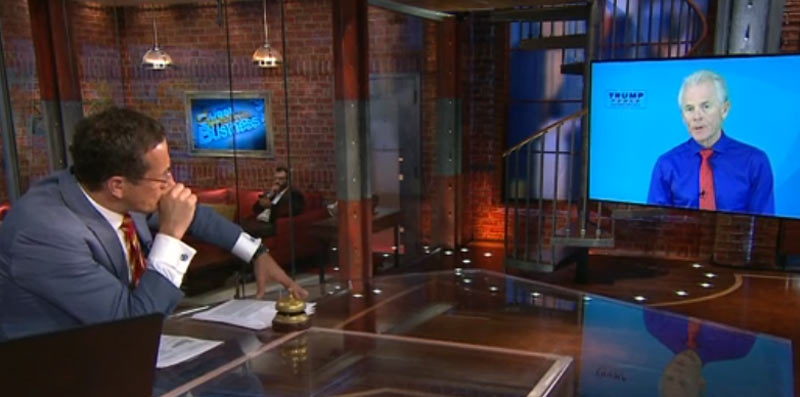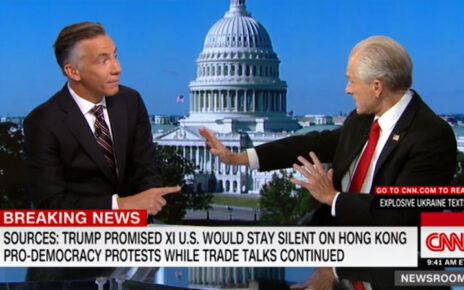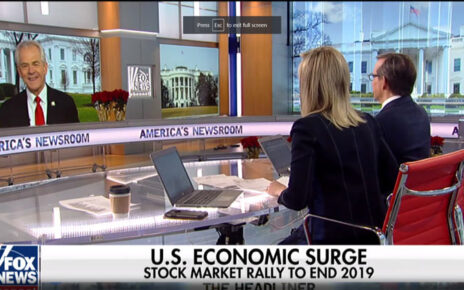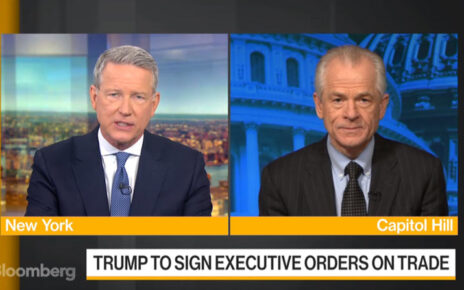March 28, 2018 – CNN, Richard Quest
RICHARD QUEST, CNN HOST: Closing bell ringing on Wall Street, goodness, eking out a small loss or a small gain. That will be an achievement today when you see the graph — yes. Oh, that’s what we want, a strong, robust gavel. A market that was simply all over the place up 100, down 70. You will see the graph later in the program. It is a sign of the volatility. It is now over on Wednesday, it’s March the 28th.
Tonight, on this program, Donald Trump’s top trade adviser, Peter Navarro, talks about tariffs, China and steel and defense. The administration’s policy that he doesn’t want a trade war. Amazon stock is falling on fears the president is obsessed with clipping its wings (INAUDIBLE). And Facebook tries to win back trust with new privacy settings. Some say it’s too little too late.
I’m Richard Quest, live in the world’s financial capital, New York City, where, of course, I mean business.
(MUSIC PLAYING)
QUEST: Good evening. Before we get to Peter Navarro, I do need to bring you some breaking news concerning the attack on a former Russian spy in the U.K. The London Metropolitan Police say Sergei Skripal and his daughter likely first came into contact with a nerve agent at their front door, not at the Italian restaurant in Salisbury, which was also contaminated but apparently the actual point of contamination or initial contamination was at their home early on. We will have more on the story in just a moment.
First, though, it’s been one of the most defining controversies of the Trump administration, the issue of trade, whether it’s impromptu tariffs, torn up trade deals, the 45th president has upended the global economic order in a matter of months.
In a moment you’re going to hear from the president’s top trade adviser, Peter Navarro, who joins us on this program from the White House.
It all comes as the administration has sealed a new agreement, the first major agreement of the Trump administration with South Korea. It’s a trade deal that as talks continue with China, Canada and Mexico.
And whilst all the countries continue to lobby for exemptions from the U.S. steel tariffs. It gives me great pleasure now to say good evening and a warm welcome to Peter Navarro, the director of the White House National Trade Council.
Director, thank you for joining us. We have much to —
(CROSSTALK)
PETER NAVARRO, DIRECTOR, WHITE HOUSE NATIONAL TRADE COUNCIL: I do remember fondly during the campaign, being your wonderful, beautiful studio way back when, so it’s good to talk with you again.
QUEST: It is and we have much to talk about. I think we need to start with an overarching view, the view is that this administration is hell bent on rewriting international trade rules in a way that is causing vast disruption and market turmoil.
NAVARRO: So if you look at the international trading system, we have essentially a system characterized by massive trade imbalances driven by unfair and nonreciprocal trade practices.
And all the president wants to do, President Trump, all he wants to do is have fair and reciprocal trade. And with respect to those massive imbalances they’re mostly the deficits are with the United States. We were on a trade deficit in goods with Europe of about $151 billion a year, 6,000 jobs per billion of deficit. That means we’re sending over a million jobs to Europe.
And with China, it is 370 billion so point is, Richard, that this is unacceptable during the campaign, dating back to the June jobs plan speech and far before that. The president said he was going to come in and get fair and reciprocal trade. So why is anybody surprised that he is actually doing it? What a concept.
QUEST: I think it’s arguably the method by which it done. Let’s take the steel and aluminum tariffs. They were announced in a somewhat haphazard way. The argument is that they were not necessarily targeted at the worst offenders. Some say it is Swiss cheese, because of the exemptions that have since been put in place and finally —
(CROSSTALK)
NAVARRO: I’m rejecting this narrative totally. What’s haphazard about the fact that we went back and the president initially ordered the Secretary of Commerce back I think it was in April to conduct an investigation of the impact of steel and aluminum imports on national security in the United States.
[16:05:00]
NAVARRO: We went through a lengthy monthly — many month-long process. Interagency process, came out with — hang on — we came out with very detailed reports of the problems and which included the aluminum sector was under siege by about 15 different countries. The steel industry was under siege about 20 different countries.
And the Secretary of Commerce recommended 25 percent tariffs on steel and 10 percent on aluminum roughly.
So what is what is haphazard about this? We went through a six-month process and came to a deliberative solution that is in the interest of national security to protect two pillar industries of this economy. As President Trump has said correctly, you do not have an aluminum steel industry in this country, we do not have a country.
QUEST: Well, you could arguably say the way in which the president casually mentioned it in the White House before anybody —
(CROSSTALK)
NAVARRO: — be specific here. I mean, again, this is a six-month long process nobody didn’t see this coming. I mean, come on. We had the reports come out that it was like hundred-page reports that said here is what we are going to do, went to the president and he did it. What’s haphazard about that?
QUEST: So let us talk about the exemptions of the idea that you have exempted — with the exception of China — many of the countries that are within the target.
NAVARRO: Not many and the exemption goes, it’s not an exemption like to get out of tariff free card. Basically, they have until May 1st to come back with an alternative plan to ensure we have national security interests – steel and aluminum protected with some kind of alternative.
Guess what? Korea came back with that and instead of a tariff, we have a 70 percent in lieu quote on steel and we keep the 10 percent tariff on aluminum. And the best part of the quota with respect to the Korean situation is that it maintains the integrity of the national security defense by defending our industry.
So there is nothing haphazard and nothing about letting countries off Scot free, we’re just proceeding in a firm but flexible way.
QUEST: There was a disagreement within the upper echelons of the administration, as you will accept there has been in economics generally over the introduction not only of these tariffs —
(CROSSTALK)
NAVARRO: Well, separate that and where you are talking about disagreements within —
QUEST: Gary Cohn, Gary Cohn, for example —
(CROSSTALK)
NAVARRO: So here is here is the situation here, we have a very healthy atmosphere inside the White House where we have differing points of view but at the end of the day once the president hears those points of view, makes a decision then everybody gets in line and that is what we do.
And that is a very healthy process so that that is what we did. Now in terms of the rest of the country looking at this, I can tell you that the rest of this country wants an aluminum steel industry so we can defend ourselves. And that’s what we’re trying to do.
QUEST: The tariffs that were announced on China’s, same process, I accept. It was a full process, full investigation and then the report but —
(CROSSTALK)
QUEST: — but there is a feeling or a perception that this administration in some shape or form is spoiling for a fight. Some would say a trade war.
I would say just a — I’ll be more neutral and say just a fight.
NAVARRO: So today, Richard, today was historic. A lot of news went on today but 10-20 years from now in the history books this day will be marked as historic because this was one of the first times an American president has ever successfully renegotiated a horrible trade deal.
And the president did that and what it does is it symbolizes how trade peace can come about and bring about fair and reciprocal trade. This was the poster child for trade peace through good negotiations with our allies and partners.
What do you not like about this result, today, Richard?
We’ve strengthened the economic relationship. We’ve strengthened the national security relationship. We’ve defended the workers that work in our factories here in America. And it is all good.
QUEST: Well, I don’t want to get too much into the South Korea —
(CROSSTALK)
QUEST: — some people suggest that that deal is effectively most of the — most of the deal is what was agreed with TPP anyway, that the —
(CROSSTALK)
NAVARRO: Are you kidding me? It has got nothing to do with —
(CROSSTALK)
NAVARRO: Are you kidding me? It is an empty set when you compare that to TPP. What did we do in this agreement today? Well, first of all, we extended the protection for our light truck industry out to 2041. We were about to get hammered by that, score one for Detroit. We are able now to sell more cars to Korea. We sell one car —
[16:10:00]
NAVARRO: — for every 20 they send us. And why?
Is because Korea has these huge nontariff barriers to score one for free trade, we were able to get very innovative — hang on. This is important.
We put in a subagreement on currency undervaluation. As you know, Richard, if you have a country that is undervaluing the currency, that gives them an edge in their exports, penalizes our exports and results in a higher trade deficit.
These are all innovative, visionary things by the man behind me in that house, who has done just a wonderful job here, since he is gotten here. We’ve had the first year of this administration have the most successful year in economics of any modern president you can remember.
QUEST: I want to push forward, if I may, Peter, and talk about NAFTA.
Are you confident that a deal can be reached on the remaining issues, like, for example, national origin, the amount of (INAUDIBLE). Do you think a deal can be done on NAFTA?
NAVARRO: So I stay in my lane. The man who is going to negotiate this is Ambassador Robert Leitheiser, the United States trade rep. He’s going to do that in close consultation with president Donald J. Trump.
Those two are the toughest negotiators in this country. They can get a good deal. We’re going to get a good deal and the people of this country should be very comfortable with the idea that finally somebody in the White House is looking after their interests.
QUEST: The conversation that the president had yesterday with Chancellor Merkel, this idea now that Germany and France with the United States might provide a united front against China, against unfair trade practices. This is an interesting development.
NAVARRO: Let me say this, I think it is generally understood that we have a situation where China is not only stealing the intellectual property of the world from Europe to the United States and Japan. They’re also engaged in this pernicious practice called forced technology transfer, whereby a
German company or American company wants to go and get access to the Chinese market has to be a joint venture partner in a minority stake and surrender their technology.
If you look at some of the best studies of that, they actually come out of things like European Union Chamber of Commerce, the scathing (ph) study of that, there is a thing called a Mercator institute in Berlin.
So everybody agrees that China really is getting away with murder on intellectual property and, yes, we’re working really hard with our allies and partners to have a united front on this issue.
And this is, again, an example of how President Trump shows leadership not just here in the U.S. but in the international environment.
QUEST: Peter, we have to leave it there. You have other commitments. I could go on much longer so I merely ask for an understanding between us that you will come back again in the future.
NAVARRO: You know, I loved talking to you during the campaign. This has been a very pleasurable experience and hopefully someday I can get back up at the studio. Although this isn’t a bad digs here, either.
QUEST: Maybe I’ll come down to your digs and you can —
NAVARRO: Hey, that would be great.
QUEST: Good to see you, Peter, thank you very much indeed.




